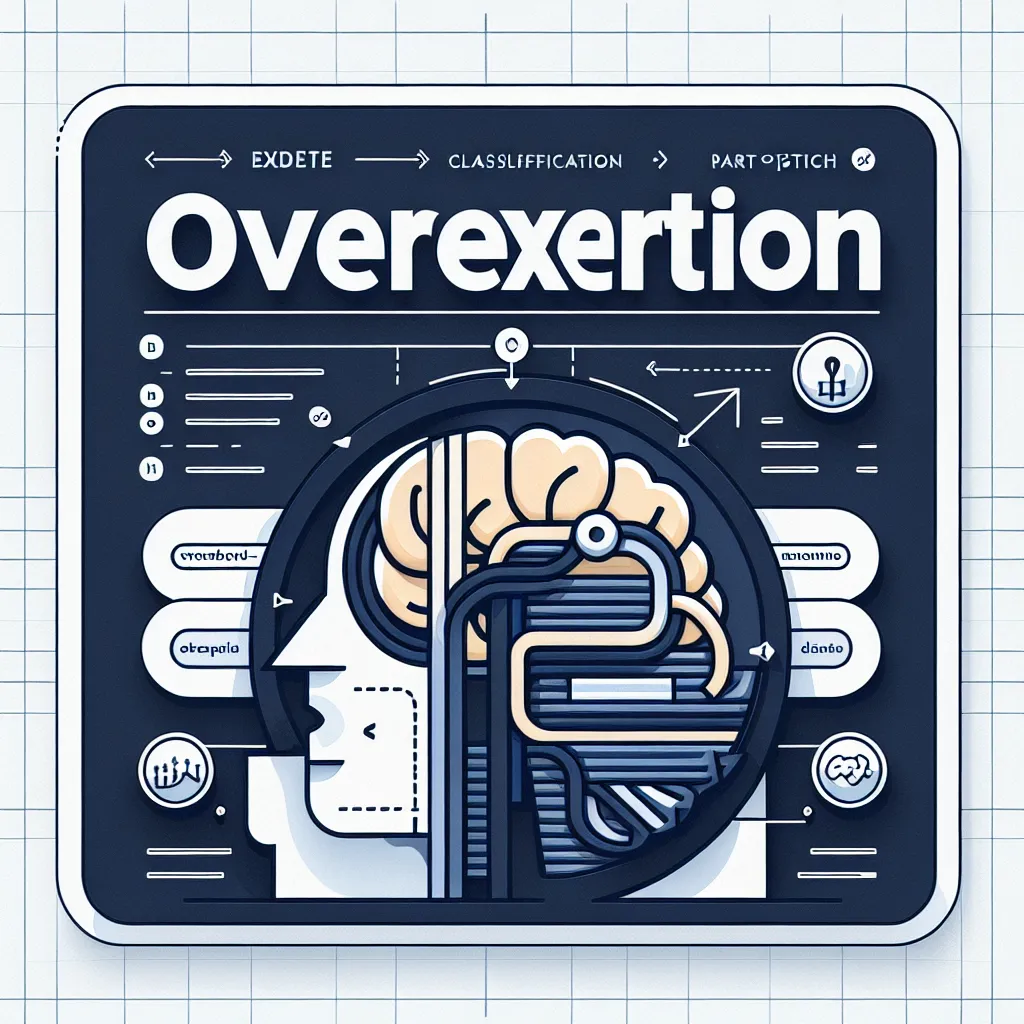Overexertion is a crucial concept that often appears in IELTS exams, particularly in discussions about health, fitness, and work-life balance. As an IELTS candidate, understanding this term and its usage can significantly enhance your vocabulary and boost your performance across all sections of the test.
Definition and Pronunciation
Overexertion (noun)
/ˌəʊvərɪɡˈzɜːʃn/ (UK) or /ˌoʊvərɪɡˈzɜːrʃn/ (US)
Definition: The act of exerting oneself or straining beyond one’s capacity; excessive effort that can lead to physical or mental exhaustion.

Context and Usage
Understanding the context in which ‘overexertion’ is used is crucial for IELTS success. Let’s explore some examples:
-
“The athlete’s overexertion during training led to a severe muscle strain, forcing him to withdraw from the competition.”
- Analysis: This sentence demonstrates how overexertion can result in physical injury, particularly in a sports context.
-
“Many office workers suffer from stress-related illnesses due to overexertion in their demanding jobs.”
- Analysis: Here, overexertion is used in a professional setting, highlighting its relevance to mental strain and work-related stress.
-
“The hiker’s overexertion on the steep mountain trail resulted in exhaustion and dehydration.”
- Analysis: This example shows how overexertion can occur in recreational activities and lead to physical consequences.
-
“Students often experience burnout from overexertion during exam periods, neglecting their health in pursuit of high grades.”
- Analysis: This sentence applies the concept to an academic context, which is particularly relevant for IELTS test-takers.
-
“The company implemented new policies to prevent employee overexertion and improve work-life balance.”
- Analysis: This example demonstrates how the term can be used in discussions about workplace policies and employee wellbeing.
Frequency in IELTS
‘Overexertion’ is moderately common in IELTS exams, appearing more frequently in:
- Reading passages about health, sports, or workplace issues
- Listening sections discussing fitness or work-related topics
- Writing Task 2 essays on topics related to work-life balance or public health
- Speaking Part 3 discussions about exercise, stress management, or career challenges
Vocabulary Analysis
Word Structure
- Over- (prefix): meaning excessive or too much
- Exertion (root): the action of making a physical or mental effort
Understanding this structure can help you recognize and remember similar words like ‘overwork’ or ‘overuse’.
Synonyms and Antonyms
Synonyms (with definitions and pronunciations):
-
Overstraining (noun) /ˌəʊvəˈstreɪnɪŋ/
Definition: Exerting oneself beyond one’s capacity or limits. -
Overwork (noun) /ˌəʊvəˈwɜːk/
Definition: Excessive work or labor. -
Burnout (noun) /ˈbɜːnaʊt/
Definition: Physical or mental collapse caused by overwork or stress.
Antonyms:
-
Moderation (noun) /ˌmɒdəˈreɪʃn/
Definition: The avoidance of excess or extremes. -
Rest (noun) /rest/
Definition: Cease work or movement in order to relax, refresh oneself, or recover strength.
Memorization Techniques
Mind Mapping
Create a mind map with ‘Overexertion’ at the center, branching out to related concepts:
- Physical effects: muscle strain, exhaustion, injury
- Mental effects: stress, burnout, decreased productivity
- Contexts: sports, workplace, academics
- Prevention: rest, pacing, time management
Storytelling
Craft a memorable story: “Oliver, the overambitious office worker, often overexerted himself, working overtime every day. His overexertion led to overwhelming stress and, eventually, a breakdown. Oliver learned that overcoming his workaholic tendencies and finding balance was the key to success.”
Practice Exercises
-
Sentence Formation: Create three sentences using ‘overexertion’ in different contexts (sports, work, and personal life).
-
Essay Practice: Write a brief paragraph about the dangers of overexertion in modern society and suggest ways to prevent it.
-
Speaking Exercise: Prepare a one-minute speech on how to maintain a balance between hard work and avoiding overexertion.
-
Reading Comprehension: Find an article about burnout or work-related stress and identify how ‘overexertion’ or its synonyms are used in the text.
-
Listening Practice: Listen to a health podcast discussing the effects of overexertion and take notes on the key points.
Conclusion
Mastering the term ‘overexertion’ and its related vocabulary can significantly enhance your IELTS performance. Remember to use it in appropriate contexts, and practice incorporating it into your writing and speaking exercises. By understanding its nuances and applications, you’ll be better equipped to tackle various topics in the IELTS exam.
We encourage you to share your experiences with learning and using this term in the comments below. How has understanding ‘overexertion’ improved your English skills? Do you have any questions about its usage in specific IELTS contexts? Your insights and queries can help create a valuable learning community for all IELTS aspirants.
For more IELTS vocabulary tips and strategies, check out our articles on quickness drills and load management, which can help you balance your study efforts and avoid overexertion in your IELTS preparation.